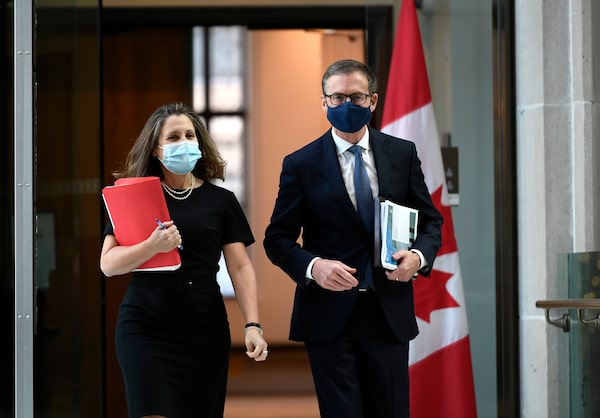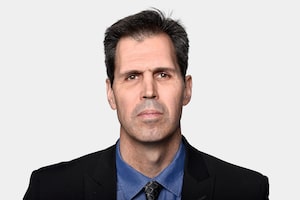Russian Finance Minister Anton Siluanov at a G20 summit in Rome on Oct. 30, 2021. At the G20 meeting earlier this month, top finance officials from Canada, Britain and the U.S. walked out in protest as Mr. Siluanov began to speak.GUGLIELMO MANGIAPANE/Reuters
As far as get-togethers of the world’s economic leaders go, last week’s IMF and World Bank meetings in Washington were an awful long way from normal. Some of the biggest names in attendance couldn’t sit quietly and pretend otherwise.
At a midweek gathering of G20 finance ministers and central bank bosses, the most pressing topic of discussion was Russia’s unprovoked and potentially economically ruinous invasion of Ukraine. Ukraine’s Finance Minister was invited to take part. In a perverse twist, Russia – as a member of the G20 – was also at the table (albeit remotely), despite the objections of several other G20 members, including Canada.
When Russian Finance Minister Anton Siluanov began to address the meeting, several top officials walked out. The protest was led by some of the most important and powerful people in attendance: U.S. Treasury Secretary Janet Yellen, U.S. Federal Reserve Chair Jerome Powell, European Central Bank President Christine Legarde and Bank of England Governor Andrew Bailey. Canada’s delegation – Deputy Prime Minister and Finance Minister Chrystia Freeland as well as Bank of Canada Governor Tiff Macklem – also walked.
The crisis in Ukraine is pulling monetary policy in multiple directions
Markets overstate scale of economic risk from Ukraine invasion, but not sincerity of fear
“The main topic we were discussing were the impacts of this invasion on Ukraine, on countries around Ukraine, on Europe, on the global economy, the impacts of higher prices that all our citizens are now paying. … The very cause of this shock to the global economy is sitting at the table,” Mr. Macklem said in a roundtable discussion with reporters the day after the walkout.
“It’s unacceptable,” he said.
To say the action sucked the air out of the meeting would be putting it mildly. But it also shone a spotlight on the fractures in the rules-based economic system that have been ripped wide open by Russia’s war in Ukraine.
More than 70 years of global financial and economic cooperation – embodied by the IMF and World Bank – looked pretty dysfunctional at last week’s meetings. A lot of officials spent the week talking about the importance of maintaining those key global economic institutions – as well as the younger World Trade Organization (WTO) the backbone of rules-based open trade for the past quarter-century – as if their continued existence had come into serious question.
U.S. Treasury Secretary Janet Yellen advocates a trade strategy of 'friend-shoring' – pursuing trade agreements with 'a large number of trusted countries' to ensure security both of market access and supply chains.LEAH MILLIS/Reuters
At very least, the meetings have raised a lot of questions about whether the world’s relied-upon economic institutions are built to deal with outright warfare. The institutions were essentially created to reduce and even replace the threat of military solutions to international disputes, not co-exist with it.
“If this persists, you will see a shift. I think there’s going to be increasing emphasis on trading and doing business only with countries that respect international law. We cannot be working with countries that don’t respect international law,” Mr. Macklem said.
“Let me put it this way: when we talk about open trade, I think we’re going to be talking about open and secure trade now.”
Ms. Yellen made a case for this concept of secure trade in a speech two weeks ago.
“We need to modernize the multilateral approach we have used to build trade integration. Our objective should be to achieve free but secure trade. We cannot allow countries to use their market position in key raw materials, technologies or products to have the power to disrupt our economy or exercise unwanted geopolitical leverage,” Ms. Yellen said in an address to the Atlantic Council.
She advocated a trade strategy of “friend-shoring” – pursuing trade agreements with “a large number of trusted countries” to ensure security both of market access and supply chains.
Those sorts of ideas were already gaining momentum in light of the COVID-19 pandemic, which laid bare the fragility of highly globalized and interdependent supply chains. The war in Ukraine has emphasized how that interdependence can be used as an economic weapon.
Ms. Legarde argued in a speech last week that Russia’s attack on Ukraine “has triggered a fundamental reassessment of economic relations and dependencies in our globalized economy.”

Finance Minister Chrystia Freeland and Bank of Canada Governor Tiff Macklem were among the dignitaries who walked out of the meeting of top finance officials from the world’s 20 largest economies last week as Russian representatives spoke.Justin Tang/The Canadian Press
“In a postinvasion world, it has become increasingly untenable to isolate trade from universal values, such as respect for the international rule of law and human rights.”
That will be largely uncharted territory for the WTO, which has built its rules around reducing trade barriers with little provision for security and human-rights priorities. Stephen Olson, former U.S. trade negotiator and senior research fellow at the Hinrich Foundation, a global trade think tank, cautioned that there may be considerable risk in trying to combine open trade with security concerns within such global institutions.
“Despite the many shortcomings of the so-called rules-based global trade system, the economic development and interdependence it has helped create has been a primary driver of the relative peace and prosperity the world has enjoyed for seven decades,” Mr. Olson wrote in a research article last week.
He warned that in pursuing security and humanitarian objectives, we could end up in “an increasingly balkanized world in which conflict is more likely, and potential development through trade has been sacrificed.”
“Over time, such an outcome would produce its own set of tragic consequences.”
Your time is valuable. Have the Top Business Headlines newsletter conveniently delivered to your inbox in the morning or evening. Sign up today.
 David Parkinson
David Parkinson